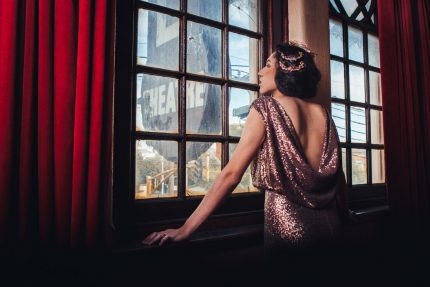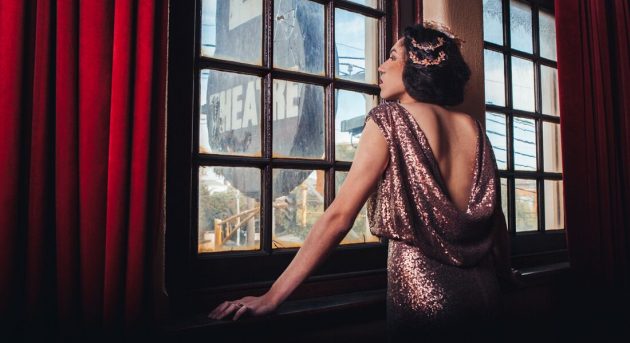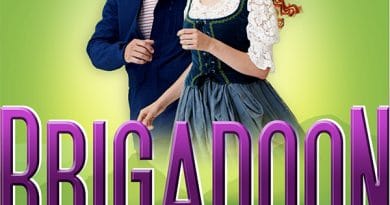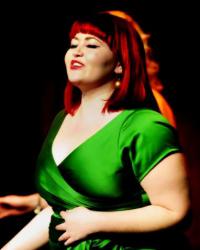Mama Alto on the intersection of identity, activism and performance
In a time where conformity is expected and otherness is denied the right to thrive, Mama Alto is a figure that stands firmly against a strong tide of ignorance. The power of her performance is unique and seemingly never-ending – not only does she have the vocal ability to transport her audiences to an ethereal plane, but she chooses to use her singular talent to advocate, educate, and agitate. She is an artist that won’t rest at industry standard, instead pushing to make sure her performances are a truly inclusive event for diverse art makers and audiences alike.
Tomorrow, Mama Alto will present her only solo show, Exquisite, at the National Theatre. In the lead up to her performance, AussieTheatre took the chance to talk to Mama about the line between entertainment and politics, and how Australian theatre artists can use their privilege to protect and celebrate identities our society would prefer to remain silent.
Mama Alto blurs the line between performer and political activist, to what degree do you believe your art has the power to make a difference to our society?

Art touches individuals, and society comprises of individuals. Social change sometimes occurs as a dramatic and sudden moment, a decisive floodgate, but sometimes it occurs as a gradual murmuration through each individual in a collective. One of my idols and mentors, Moira Finucane, has said: “small acts of kindness can have epic consequences.” Another one of our local LGBTIQA+ heroes, Daniel Witthaus, said: “a community is made through the accumulation of small kindnesses.” I would never be as arrogant and presumptuous to think that I, or my art, could change the world, but maybe we all have one small part to play in making it a better place, one conversation at a time.
Was there ever a time in your career that you thought your advocacy would have a negative impact on your prospects? If so, did you change anything because of that experience?
In all honesty, and it is not something I’ve discussed often, when I first began performing, I was very frightened that being an outspoken advocate or activist who pushes for social change and fights against oppression might have a negative impact on my career – specifically I feared lower ticket sales, alienating potential audience members, being spurned by the press. Ultimately I realised that anyone who holds minorities and marginalised people as inferior human beings, including but not limited to those minoritised, marginalised and Othered aspects of my own identity, was not someone who could genuinely love or value me. Would I just be a performing monkey for these people, rather than actually reaching them as an artist, as a human being – and if so, why did I worry? However, it also made me realise that perhaps, through artwork that is at once seductive but subversive, these people might be reached, and confronted, challenged or changed. If they love jazz music, if they love cabaret singing, if they love storytelling, but they hold homophobic, transphobic, racist, xenophobic or misogynist views, and they encounter someone queer, someone gender diverse, someone brown, someone feminine who shares and articulates the art that they love and relate to, maybe that can reach their hearts and change their minds.
Your biography mentions your belief in the “radical potential” of storytelling. Can you explain your belief in the power of storytelling through performance?
To my mind, the radical potential embedded within storytelling is two important possibilities. Honest, open, storytelling – opening your ribcage and pouring your heart, your lived experiences, your identity, your traumas and your tragedies, your contradictions and your complexities into a song – can touch people. The first possibility is that this may affirm their own lived experiences, validate their identity, help them through whatever it is they are going through, empower them against the storm. The second possibility is that this may challenge, confront or change their views – their prejudices or discriminations or preconceptions. Or it might do neither, or both, depending on each audience member, on any given day, within their life and times. But I think if a performance touches even just one heart, that’s worth something.
We are living in a time where political apathy has dire social repercussions, do you believe artists and theatre makers have a moral imperative to advocate through their vocation?
Whilst there is enormous value and importance in art that is made to entertain – to take people out of their own lives for a brief moment, to make us laugh and simply switch off and enjoy (surely related to the self-care we discussed earlier) – I do believe artists have an important power, privilege and responsibility of advocacy. Politician Joan Kirner reminded us that to be apolitical is still a political choice, and humanitarian Elie Wiesel articulated that neutrality assists the oppressor, and with that in mind the power of art to communicate humanity, equality and empathy takes on a sociopolitical urgency that can be put toward social change – whether that be in ways that are implicit or explicit, subtle or didactic, layered or direct. And if you hold that kind of agency, and if you care, aren’t you compelled to use it?
The arts community houses a large number of LGBTI people, a group known for a history of protest and celebration leading to revolution. Does the Australian arts industry have the capacity to campaign and help achieve marriage equality?

It undoubtedly does, if we all use our voices wisely. Importantly, it also has the capacity to protect, heal and support those in our communities who are most attacked by the hate speech, discrimination and dehumanisation which is masquerading as a campaign against marriage equality. Furthermore, the industry has the capacity to campaign for and advocate for the rights, dignity and safety of LGBTIQA+ people beyond marriage equality, as well as people of colour, Indigenous people, asylum seekers and refugees who are (under international humanitarian law) illegally detained, people experiencing homelessness, people experiencing disabilities, and more.
What are your tips for performers who are wanting to begin advocating for marginalised communities or social issues?
Begin with your own intersections, and then expand outwards from there. To share a fabulous quote from Candy Bowers, “Begin with your own centre, and then acknowledge there are a multiplicity of centres.” Connect with people on a genuine level, and operate from a place of care, but prioritise the views and voices of communities. Always remember the adage “nothing about us without us” and although you can advocate in solidarity, never speak for a group that you are not part of, and amplify voices wherever possible. Don’t set out to change the whole world in one go, but think instead about a small pebble creating ripples in the lake. Take a deep breath, and open your heart.
Mama Alto will present Exquisite, her only full length solo performance in 2017 at the National Theatre in Melbourne on Saturday night. Tickets can be booked at this link.




